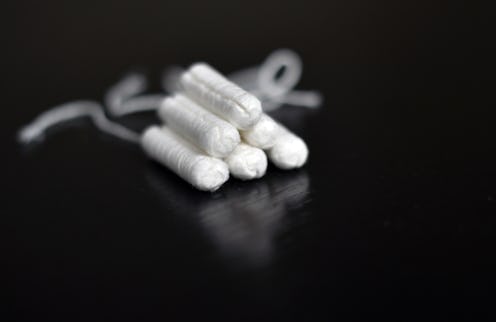News
Most Men Don't Think Affordable Pads & Tampons Are A Basic Right

In recent years, the question of whether health care should be a human right has become increasingly prevalent and commonly asked, thanks in no small part to the constant tug-of-war between conservatives and progressives on what kind of health care system is best. But there's a specific question under that umbrella that men probably haven't considered nearly as often as women have ― how many men consider pads and tampons a right?
While many men may not frequently have much reason to consider this question, it's a fact of life that women grapple with regularly. And the polling numbers on this question really bear out that difference; according to a YouGov survey of 2,268 American adults, a mere 46 percent of men responded that access to feminine hygiene products should be considered a right rather than a privilege, while 66 percent of women believed it should be.
Additionally, 53 percent of women said they'd found themselves without a tampon or pad during their period at least once in their lives, while 38 percent said it happens either once every few periods, or more often than that. In short, this is an area where there's a very noticeable, sharp divide between men and women's perceptions. The survey also found that 58 percent of responding women had bled through a tampon or pad in public more than once in their lives, with 77 percent saying it happened at least once.
Making women's hygiene products more easily available could be a matter of public policy, but it will demand both public sentiment in favor of increased access, and the political will to do so. And given that both chambers of the U.S. Congress are overwhelmingly male ― roughly 80 percent in both the House and Senate ― the fact that there's such a sharp divide between men and women on this issue is a bad omen for getting anything done.
But the fact that women aren't a monolith on this issue is also worrisome. While it's true that 66 percent of women believe such hygiene products should be considered a right, that means that another 34 percent of women don't believe it should be a right. To be specific, 24 percent of the women surveyed disagreed with the notion, and 14 percent of them strongly disagreed.
The obvious upshot of calling tampons and pads a right rather than a privilege, of course, is that a person shouldn't be denied a right because they can't afford it. As such, the survey posed another question ― should tampons and pads be available for free in any place where they're currently sold? On that question, the gap between men and women is actually less stark, with a majority of both men and women opposed to the idea of requiring stores to supply free pads and tampons to their female customers. Specifically, just 23 percent of men and 32 percent of women agreed with that idea, while 57 percent of men and 56 percent of women disagreed.
When it comes to making such products available for free in public bathrooms, however, opinions improve. The survey found that 36 percent of men agreed with that idea, while a narrow majority of women, 51 percent, favored the idea.
Of course, these numbers aren't likely to translate into any tangible action. Sad though it may be for women, especially low-income women who would hugely benefit from it, the aforementioned male-dominated nature of American politics renders any actual political action deeply unlikely. And the fact that the concept of health care as a human right isn't even a consensus position makes the situation even worse.